Half a Century of Success
Since 1971, the Fish, Food and Allied Workers Union has played a vital role in shaping the economic, social and cultural landscape of Newfoundland and Labrador.
They said it couldn’t be done.
Nearly five decades later, the people of the fishing society are still proving them wrong. Learn more about the storied social, economic, and political past of FFAW in Newfoundland & Labrador.
History of the FFAW
In the late 1960s, Newfoundland and Labrador was still adjusting to life as a Canadian province.
The entire per capita income was only half of the rest of Canada’s, and in our fishing communities it was often worse. Fishing was hard and given little value in a fishery dominated by merchant control.
Traditionally, men worked aboard the boat either as inshore fishermen or as trawlermen aboard merchant vessels. Women and men alike worked in the plants – processing, salting, freezing, and boxing fish for export. Plant workers were not protected by minimum wage laws, so pay was miserable and working conditions harsh.
For the fish harvester, the companies set the prices. The harvester’s only choice was to go fishing or stay home. It was dangerous work for meager earnings. The harvesters were at the mercy of the merchants, who looked down on and exploited those who made them wealthy.
For the necessities of everyday life that they could not produce themselves, fish harvesters depended on the merchant who sold them their gear in the spring, bought their fish in the fall, and sold them their supplies for the winter. Living under this system, most families rarely saw actual cash from their year’s labour. Their lives’ fortune or misfortune was but a line on the merchant’s ledger.
It was during a conversation between three longliner skippers on the Northern Peninsula – Gene Gould, Ralph O’Keefe, and Robert Spence of Port au Choix – that the decision was reached to build a Union.
They held the first meeting in November of 1969 in Port aux Choix. They aired their grievances and came up with a plan. They elected a steering committee to take the steps towards formal organization. But starting a Union of fishermen was a complicated affair that needed legal help. So, young Richard Cashin was called in.
On April 25, 1970, two hundred fishermen met again in Port au Choix, where the Northern Fishermen’s Union (NFU) was formed. The members spanned from Port Saunders through Port au Choix, to Bartlett’s Harbour as far north as Anchor Point. The Union had also signed up most of the workers in the Port au Choix processing plant.
The first constitutional convention was in April of 1971 where the Newfoundland Fishermen, Food and Allied Workers Union (NFFAW) was officially formed. Richard Cashin was elected President; and Kevin Condon, a Calvert fish harvester and Union Founder, was elected Vice President.
The merchants were now being challenged on several fronts. And the Union’s first major battle was brewing – not on the Northern Peninsula, but in the heart of merchant control on the Island’s south coast. The battle of Burgeo would set the stage for a new era in Newfoundland and Labrador’s history, and a new future for the fishing industry.
There are no easy fixes when it comes to the challenges we face. But we know that when we work together in solidarity, we can achieve remarkable things.
CELEBRATING OUR PAST - STEERING OUR FUTURE
A historical timeline of the FFAW
1969
The companies controlled the prices, and fish harvesters had no leverage other than to choose not to go fishing. He discussed the idea of a cooperative or a union with these fish harvesters, and the idea grew.
1970
1971
1979
Under the bold leadership of Richard Cashin, the union lobbied hard and successfully to ensure the proceeds from the northern shrimp fishery were used to benefit the people of Labrador, not just line the pockets of some remote fishing company.
1981
A Bill passed by the House of Assembly in 1981 gave fishermen equivalent coverage to other workers with the fish companies - much to their disgust - obliged to pay the premiums.
1984
1990
A Bill passed by the House of Assembly in 1981 gave fishermen equivalent coverage to other workers with the fish companies - much to their disgust - obliged to pay the premiums.
1992
A Bill passed by the House of Assembly in 1981 gave fishermen equivalent coverage to other workers with the fish companies - much to their disgust - obliged to pay the premiums.
1995
Ottawa badly underfunded TAGS, the compensation program for fishery workers put out of work by the closure of key fish stocks. In the summer of 1995, the government tried to arbitrarily roll back benefits.
2014
Keith is the son of a fish harvester (Lloyd Sullivan) from Calvert, the home of the great Kevin Condon. At 34 years old, Keith represents a generational change for the Union. He worked on the deck of his father's boat to pay his way through university.
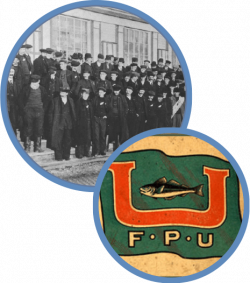
1908
Sir William F. Coaker founds the Fishermen’s Protective Union (FPU).

1951
Premier Joseph Smallwood forms the Newfoundland Federation of Fishermen (NFF) to advocate for fishermen.

1969
Father McGrath moves to Port aux Choix and raises idea of union or co-operative for fish harvesters who are powerless against merchants and locked in cycle of poverty.
Young St. John’s lawyer and former MP, Richard Cashin, wins landmark settlement against Electric Reduction Company for Placentia Bay fish harvesters impacted by toxic waste in the bay.
Gene Gould, Ralph O’Keefe, and Robert Spence of Port aux Choix made decision with Father McGrath to form a union. The first meeting is held in November 1969, and 69 people attended.

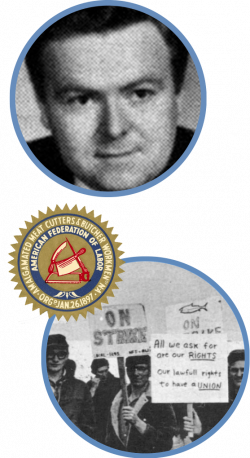
1970
Cashin agrees to join Father McGrath in organizing fish harvesters for union certification. Organizing efforts also include plant workers who face same oppression from merchants.
Support from the Amalgamated Meat Cutter’s Union in Chicago gives the union start-up the financial and personnel backing needed to go beyond the Northern Peninsula as word travelled, and interest grew.

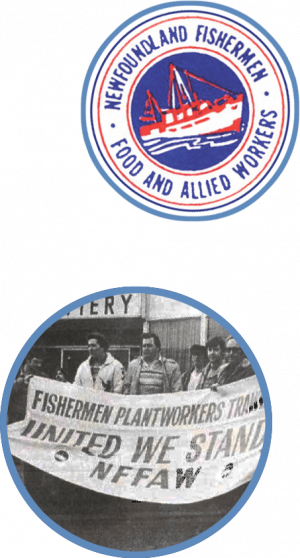
1971
The Newfoundland Fishermen, Food and Allied Workers Union (NFFAWU) holds its founding convention in April 1971. Richard Cashin is elected President and Kevin Condon is elected Secretary-Treasurer.
The provincial government passes the Fishing Industry Collective Bargaining Act, giving fish harvesters collective bargaining rights.
Ray Greening is elected Secretary-Treasurer after playing pivotal role in managing Burgeo through the dispute.
It Started In Burgeo – The Labour Relations Board certified the NFFAWU as bargaining agent for plant workers but the employer refused to recognize. Workers vote to strike. Ray Greening is elected Secretary-Treasurer after playing pivotal role in managing Burgeo through the dispute.

1972
Frank Moores wins election and as promised during his campaign, the government buys Burgeo plant from the Lakes’ and a contract is negotiated with the workers. Landmark victory for the NFFAWU and trade unions across the continent.
1973
Union negotiates a contract increasing plant worker wages by 72%, provides grievance procedures, seniority clause, paid holidays, and a health plan.
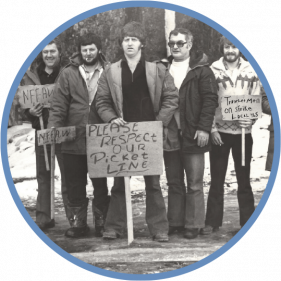
1974
Inshore harvesters on the Northern Peninsula strike for high fish prices. South Coast trawlermen tie up in support, and then remain tied up to advocate for their own interests. Harris Report recommends majors changes to relationship between trawlermen and companies.

1975
Trawlermen overwhelmingly vote to strike with goal of achieving recommendations in Harris Report. The strike is eventually settled providing breakthrough gains including a doubling of income for trawlermen.
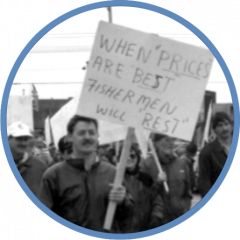
1977
Union begins to bargain province-wide master collective agreements with the association representing fish processors.

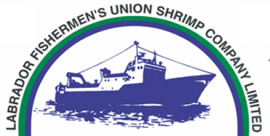
1978
Union successfully lobbies the federal government to have offshore shrimp licenses set aside for people of the Labrador Coast.
Union holds a public meeting in Labrador that leads to the creation of the Labrador Fishermen’s Union Shrimp Company (LFUSC).

1979
First over-the-side sales of mackerel and squid organized by the Union provides important opportunity, and millions of dollars in sales, for inshore fish harvesters.
Second year of Over the side sales expands to cod and turbot in Labrador and continued pelagic and groundfish sales around the island. Fish Merchants lobby to shut it down. Cashin wins the battle to keep buying resulting in millions of dollars to inshore fishers.
1980
2300 workers held 13-week strike at Fishery Products, leading to increased wages and improved working conditions. The agreement sets precedent for other processing plants in the province.
Buyers unilaterally drop fish prices and stop deducting union dues. The Union calls a strike and - following a 5-week tie up - harvesters win price increase and plants resume deduction of dues.
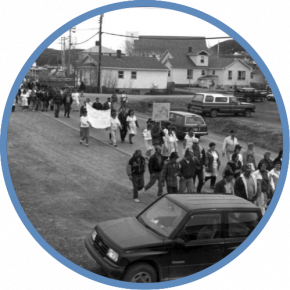
1984
Unity 1984 Campaign further solidifies the solidarity between trawlermen, fish harvesters and plant workers to negotiate fair contracts with adequate wages as high interest rates and weak markets hit the industry.
Kirby restructuring plan leads to creation of Fishery Products International (FPI), which immediately becomes largest employer of fish plant workers and trawlermen and largest buyer of inshore fish in province.
Trawlermen strike for six-months until new management team is brought in at FPI and demands for rollbacks are taken off the table.

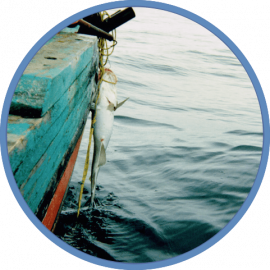
1986
Fish harvesters begin raising the alarm on Northern cod stocks only to be dismissed by science. Catch rates continue to decline.


1987
FFAW leaves parent union UFCW to join the Canadian Auto Workers Union (CAW).

1989
Scientific advice for Northern cod abruptly adjusts the biomass index less than half the previous estimate.

1990
Fish plants start to close as landings continue to significantly decline.
Molson workers join the FFAW.

1991
Steel Fabrication Plants are certified with the FFAW.
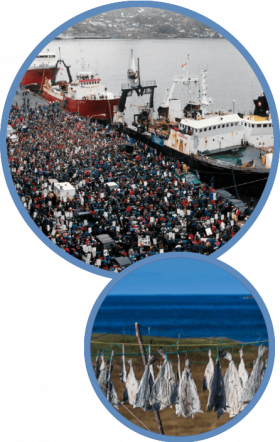
1992
Union plays a leading role in bringing public attention to foreign overfishing. Protests at sea and massive rallies in St. John’s.
Federal Fisheries Minister John Crosbie announces the Cod Moratorium on July 2, 1992, leading to the single largest layoff in Canadian history.

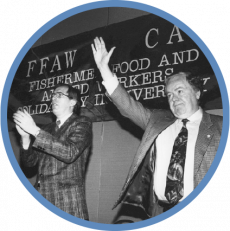
1993
Cashin announces his retirement after 23 years as Union president. Earle McCurdy takes over from Cashin after 23 years as President. Reg Anstey is elected Secretary-Treasurer.

1994
A 5-year, $1.9 million Atlantic Groundfish Strategy (TAGS) is announced by the federal government, with the goal of replacing the expiring post-moratorium support program.
1995
Union negotiates contract with Canship Shuttle Tanker Fleet to employ displaced FPI and National Sea deepsea fisher.
The Union plays a leading role in the formation of the Canadian Council of Professional Fish Harvesters (CCPFH).
The Union gains the <35’ fleet first access to snow crab in 2J3KL and 3Ps.
The Cod Sentinel Project is launched, giving harvesters a greater voice and a seat at the scientific assessment table.
The federal government engages in the “Turbot War” with Spain as heavy foreign overfishing continues. The Union organizes a major protest to meet the arrested Spanish trawler in the St. John’s harbour.

1996
The Professional Fish Harvester Certification Board (PFCHB) is established.

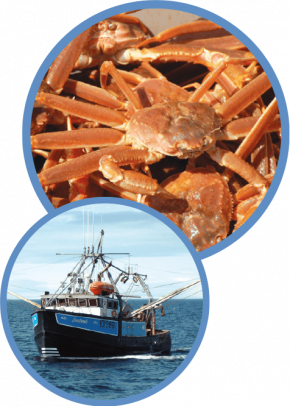
1997
Access to snow crab for small boats is expanded, and temporary permits are issued to all <35’ core enterprise owners in 2J3KL and 3Ps.
Northern shrimp access is granted to the <65’ fleet.

1999
Fishing Industry Collective Bargaining Act is amended to provide a method for price dispute settlements via independent arbitrators.

2003
Long-term closure of Northern Gulf cod fishery announced. Union stages multi-day protest, tying up the Gulf ferry service in Port aux Basques resulting in closure being lifted.
Union files legal proceedings against crab processors for illegal lockout and are successful in obtaining an injunction from the NL Supreme Court.
Reg Anstey steps down as Secretary-Treasurer, replaced by David Decker.

2004
Province-wide collective bargaining begins for Northern shrimp.

2005
Provincial Tories introduce the Raw Material Sharing resulting in thousands of fishers and plant workers converging on St. John’s to fight the Draconian Law and occupy the Provincial Minister of Fisheries office for days. Premier Danny Williams eventually capitulated. Major victory for fishers and industry workers.
Permanent Price Setting Panel given authority to resolve price disputes with decisions binding on all buyers.


2007
FPI is put up for sale. The marketing arm of the company is sold to High Liner Seafoods of Nova Scotia, while the plant and trawler operations are purchased by NL-based Ocean Choice International (OCI).

2008
A global economic recession impacts the market for seafood, as well as industrial, retail and service industries.
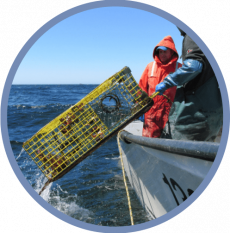
2009
Four-day lobster tie-up and occupation of federal offices leading to a commitment from the federal government for project funding aimed at conservation, rationalization, and value-added in the lobster fishery.

2010
Richard Cashin Building, new home of the FFAW, is opened at 368 Hamilton Avenue, in St. John’s.
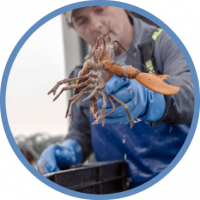
2011
Joint federal-provincial-industry lobster license buyout program.
Market based formula for lobster pricing developed, leading to nearly 200% increase in next 10 years.

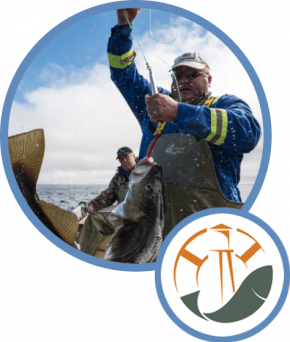
2012
Canadian Independent Fish Harvesters Federation is established.
Newfoundland Labrador Fish Harvesting Safety Association (NL-FHSA) is established.

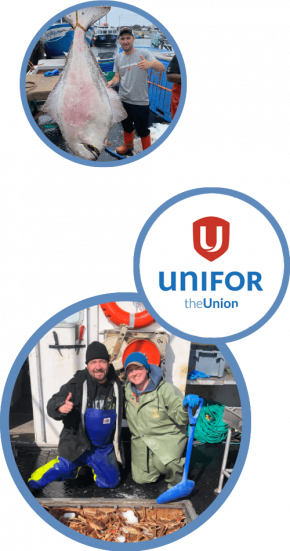
2013
The Union leads the development of a new Gulf Halibut Management Plan, improving safety, value, and sustainability for Gulf halibut.
The Canadian Autoworkers Union (CAW) merges with CEPUC and becomes Unifor, leading to the FFAW-Unifor.
FFAW’s Women’s Advocate Program is established.

2014
Workers at the Vale nickel mine in Long Harbour unionize with FFAW, with membership growing significantly over the years.
Earle McCurdy announces retirement, Keith Sullivan is elected as new President.

2016
Efforts to raid the Union begin, but application is eventually rejected by the Labour Relations board in 2018 due to lack of support.
Last In, First Out (LIFO) policy for Northern shrimp is abolished.

2018
Federal Court of Appeal rejects the Elson case.

2019
Plant workers and fish harvesters rallied together in St. John’s.
Manufacturing and Processing Safety Sector Council is established to include seafood processing workers.

2020
Bill C-68 is passed, giving the federal Minister of DFO the power to make regulations to protect independence of license holders in commercial inshore fisheries.
Covid-19 pandemic hits. Hundreds of industrial members lose their jobs, and the fishing season faces market destabilization.
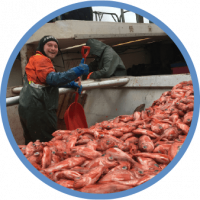
2021
Following years of science and leading an experimental fishery, the Union lobbies for adjacency access as a commercial redfish fishery gears up.


2022
Minister Murray closes the Atlantic Mackerel fishery as DFO Science refuses to acknowledge new spawning areas.
Jason Spingle is elected Secretary-Treasurer.
A review of the Fishing Industry Collective Bargaining Act (FICBA) is completed, leading to improvements with the Panel.


2023
Keith Sullivan steps down in December of 2022, and in January of 2023, Greg Pretty is elected President.
The Union ramps up campaign to reopen the mackerel fishery and continues fight for more transparency in price setting process.

